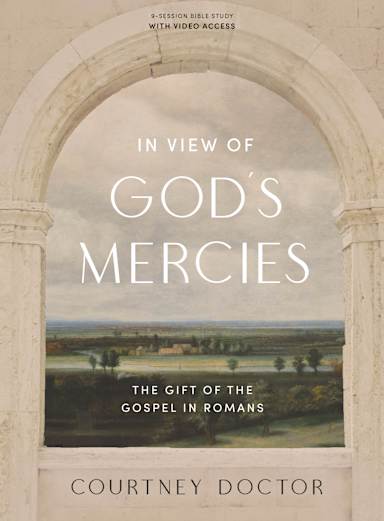We all yearn for assurance. We want to know that everything is going to be all right in the end. Young brides long for assurance that their marriages will go the distance. Cancer patients crave some guarantee they will be healed. People nearing retirement desire confidence that their savings will last their lifetimes. Mothers of young children pursue parenting formulas that will ensure their children "turn out OK." However, true guarantees are hard to come by.
But God goes out of His way to assure those of us who follow Christ that everything will be OK — infinitely better than "OK" — in the end. In Romans 8, we read that we're guaranteed:
Eternal Life: "If the Spirit of him who raised Jesus from the dead dwells in you, he who raised Christ Jesus from the dead will also give life to your mortal bodies through his Spirit who dwells in you" (v. 11).
Forever Adoption: "For you did not receive the spirit of slavery to fall back into fear, but you have received the Spirit of adoption as sons, by whom we cry, 'Abba! Father!'" (v. 15).
A Beautiful Inhertiance: "… and if children, then heirs — heirs of God and fellow heirs with Christ …" (v. 17a).
Unimaginable Glory: "For I consider that the sufferings of this present time are not worth comparing with the glory that is to be revealed to us" (v. 18).
But as we sit on the summit here in Romans 8, viewing the vista of God's indescribable mercies, we just keep seeing more.
Romans 8:28 is one of the most comforting verses in all of Scripture: "We know that all things work together for the good of those who love God, who are called according to his purpose." It has also been misused, misapplied, and mistimed. It's misused and misapplied when we imply it means that all things work together to give me exactly what I want or take it to mean nothing difficult or tragic will ever happen to me. And it's often mistimed when we offer it to others in the midst of fresh grief.
Well-intentioned people often stand at a distance and toss this verse out like a lifejacket to someone drowning in sorrow. That is usually not the time or place to offer this truth to others. Romans 8:28 is a truth we bury deep in our souls so that it will be a lifesaving truth we cling to in the midst of our own doubts and sorrows.
We don't always understand why God allows us to go through the difficulties we go through. We don't always know what He is doing or why. We can't fathom how situations are going to work out. But those aren't the things He promises us we'll know. What He has promised is that we can know (i.e. believe, trust, bank on, grasp …). He is at work for our good in the midst of everything we go through.
"We don't always understand why God allows us to go through the difficulties we go through. … What He has promised is that we can know. He is at work for our good in the midst of everything we go through."
Courtney Doctor
The reason God can make such a glorious promise to us is because He has a plan to save a people for Himself and He is sovereignly ruling over each and every step of that plan until it is fully realized. Paul used five words to explain the big picture of God's guarantee that He is working in all things to accomplish His magnificent plan of redemption.
Good scholars debate over the terms used in these two verses. Much of the discussion revolves around the word foreknew. Predestination (or election) refers to the "gracious purpose of God, according to which He regenerates, justifies, sanctifies, and glorifies sinners."1 One of the main points of discussion however is the question of whether God's predestination is based on His foreknowledge of how a person will respond to His call for salvation or if His predestination is based on foreknowledge of His own sovereign mercy and will. Here are the two major interpretations in very simplified terms:
Some scholars believe foreknew means God looked through the corridors of time and saw how each person would respond to the gospel. Knowing who would accept God's gift of salvation, God predestined, or elected, them for salvation. In this view, God's call is based on His knowing ahead of time how that particular individual would respond—either by being obedient and following or by being rebellious and walking away.
Other scholars believe foreknew means that long before someone knows God, God set His love on that person and, as a result, predestined and elected that person to respond to His call. In other words, every individual whom God calls He enables to respond obediently by following Him.
My understanding aligns more closely with the second interpretation, but, regardless of your understanding, we can agree on the fact that "God has done all that is needed to secure our eternal glory,"2 that everyone God saves will be conformed to the image of Jesus, and "all those with whom God begins this process complete it."3 That is our deep assurance. How does this strengthen you?
1 "V. God's Purpose of Grace," The Baptist Faith and Message 2000, SBC, accessed October 7, 2021.2 Douglas J. Moo, Romans, The NIV Application Commentary (Grand Rapids, MI: Zondervan Publishing House, 2000), 280.3 Christopher Ash, Teaching Romans: Unlocking Romans 1–8 for the Bible Teacher, eds. David Jackman and Robin Sydserff, vol. 1, Teach the Bible (Ross-shire, Scotland; London: Proclamation Trust Media; Christian Focus Publications, 2009), 297.
Excerpted from In View of God's Mercies. Published by Lifeway Press®. © 2022 Courtney Doctor.
In this 9-session study, walk through the book of Romans to discover that salvation doesn’t just change your eternal future; it changes your present reality. Because of God’s salvation, hope, peace, life, faith, trust, and endurance are yours.

